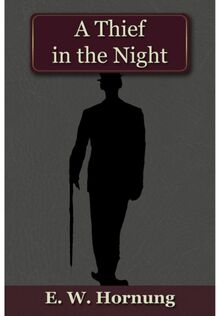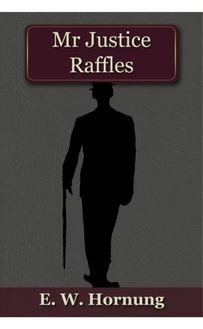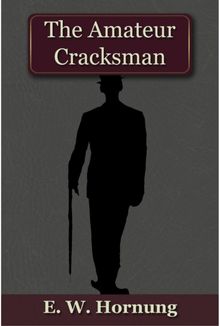Thief in the Night , livre ebook
89
pages
English
Ebooks
2011
Vous pourrez modifier la taille du texte de cet ouvrage
Obtenez un accès à la bibliothèque pour le consulter en ligne En savoir plus
Découvre YouScribe et accède à tout notre catalogue !
Découvre YouScribe et accède à tout notre catalogue !
89
pages
English
Ebooks
2011
Vous pourrez modifier la taille du texte de cet ouvrage
Obtenez un accès à la bibliothèque pour le consulter en ligne En savoir plus
Publié par
Date de parution
19 juillet 2011
Nombre de lectures
0
EAN13
9781849895439
Langue
English
Title Page
A THIEF IN THE NIGHT
By
E.W. Hornung
Publisher Information
This electronic version published in 2011 by
Andrews UK Limited
www.andrewsuk.com
This edited version, including layout, typography, additions to text, cover artwork and other unique factors is copyright Andrews UK 2011. No part of this digital publication may be reproduced, stored in a retrieval system or transmitted in any form or by any means electronic, mechanical, photocopying, recording or otherwise without written permission of the copyright owner.
Out of Paradise
If I must tell more tales of Raffles, I can but back to our earliest days together, and fill in the blanks left by discretion in existing annals. In so doing I may indeed fill some small part of an infinitely greater blank, across which you may conceive me to have stretched my canvas for the first frank portrait of my friend. The whole truth cannot harm him now. I shall paint in every wart. Raffles was a villain, when all is written; it is no service to his memory to glaze the fact; yet I have done so myself before to-day. I have omitted whole heinous episodes. I have dwelt unduly on the redeeming side. And this I may do again, blinded even as I write by the gallant glamour that made my villain more to me than any hero. But at least there shall be no more reservations, and as an earnest I shall make no further secret of the greatest wrong that even Raffles ever did me.
I pick my words with care and pain, loyal as I still would be to my friend, and yet remembering as I must those Ides of March when he led me blindfold into temptation and crime. That was an ugly office, if you will. It was a moral bagatelle to the treacherous trick he was to play me a few weeks later. The second offence, on the other hand, was to prove the less serious of the two against society, and might in itself have been published to the world years ago. There have been private reasons for my reticence. The affair was not only too intimately mine, and too discreditable to Raffles. One other was involved in it, one dearer to me than Raffles himself, one whose name shall not even now be sullied by association with ours.
Suffice it that I had been engaged to her before that mad March deed. True, her people called it “an understanding,” and frowned even upon that, as well they might. But their authority was not direct; we bowed to it as an act of politic grace; between us, all was well but my unworthiness. That may be gauged when I confess that this was how the matter stood on the night I gave a worthless check for my losses at baccarat, and afterward turned to Raffles in my need. Even after that I saw her sometimes. But I let her guess that there was more upon my soul than she must ever share, and at last I had written to end it all. I remember that week so well! It was the close of such a May as we had never had since, and I was too miserable even to follow the heavy scoring in the papers. Raffles was the only man who could get a wicket up at Lord’s, and I never once went to see him play. Against Yorkshire, however, he helped himself to a hundred runs as well; and that brought Raffles round to me, on his way home to the Albany.
“We must dine and celebrate the rare event,” said he. “A century takes it out of one at my time of life; and you, Bunny, you look quite as much in need of your end of a worthy bottle. Suppose we make it the Café Royal, and eight sharp? I’ll be there first to fix up the table and the wine.”
And at the Café Royal I incontinently told him of the trouble I was in. It was the first he had ever heard of my affair, and I told him all, though not before our bottle had been succeeded by a pint of the same exemplary brand. Raffles heard me out with grave attention. His sympathy was the more grateful for the tactful brevity with which it was indicated rather than expressed. He only wished that I had told him of this complication in the beginning; as I had not, he agreed with me that the only course was a candid and complete renunciation. It was not as though my divinity had a penny of her own, or I could earn an honest one. I had explained to Raffles that she was an orphan, who spent most of her time with an aristocratic aunt in the country, and the remainder under the repressive roof of a pompous politician in Palace Gardens. The aunt had, I believed, still a sneaking softness for me, but her illustrious brother had set his face against me from the first.
“Hector Carruthers!” murmured Raffles, repeating the detested name with his clear, cold eye on mine. “I suppose you haven’t seen much of him?”
“Not a thing for ages,” I replied. “I was at the house two or three days last year, but they’ve neither asked me since nor been at home to me when I’ve called. The old beast seems a judge of men.”
And I laughed bitterly in my glass.
“Nice house?” said Raffles, glancing at himself in his silver cigarette-case.
“Top shelf,” said I. “You know the houses in Palace Gardens, don’t you?”
“Not so well as I should like to know them, Bunny.”
“Well, it’s about the most palatial of the lot. The old ruffian is as rich as Croesus. It’s a country-place in town.”
“What about the window-fastenings?” asked Raffles casually.
I recoiled from the open cigarette-case that he proffered as he spoke. Our eyes met; and in his there was that starry twinkle of mirth and mischief, that sunny beam of audacious devilment, which had been my undoing two months before, which was to undo me as often as he chose until the chapter’s end. Yet for once I withstood its glamour; for once I turned aside that luminous glance with front of steel. There was no need for Raffles to voice his plans. I read them all between the strong lines of his smiling, eager face. And I pushed back my chair in the equal eagerness of my own resolve.
“Not if I know it!” said I. “A house I’ve dined in - a house I’ve seen her in - a house where she stays by the month together! Don’t
put it into words, Raffles, or I’ll get up and go.”
“You mustn’t do that before the coffee and liqueur,” said Raffles laughing. “Have a small Sullivan first: it’s the royal road to a cigar. And now let me observe that your scruples would do you honor if old Carruthers still lived in the house in question.”
“Do you mean to say he doesn’t?”
Raffles struck a match, and handed it first to me. “I mean to say, my dear Bunny, that Palace Gardens knows the very name no more. You began by telling me you had heard nothing of these people all this year. That’s quite enough to account for our little misunderstanding. I was thinking of the house, and you were thinking of the people in the house.”
“But who are they, Raffles? Who has taken the house, if old Carruthers has moved, and how do you know that it is still worth a visit?”
“In answer to your first question - Lord Lochmaben,” replied Raffles, blowing bracelets of smoke toward the ceiling. “You look as though you had never heard of him; but as the cricket and racing are the only part of your paper that you condescend to read, you can’t be expected to keep track of all the peers created in your time. Your other question is not worth answering. How do you suppose that I know these things? It’s my business to get to know them, and that’s all there is to it. As a matter of fact, Lady Lochmaben has just as good diamonds as Mrs. Carruthers ever had; and the chances are that she keeps them where Mrs. Carruthers kept hers, if you could enlighten me on that point.”
As it happened, I could, since I knew from his niece that it was one on which Mr. Carruthers had been a faddist in his time. He had made quite a study of the cracksman’s craft, in a resolve to circumvent it with his own. I remembered myself how the ground-floor windows were elaborately bolted and shuttered, and how the doors of all the rooms opening upon the square inner hall were fitted with extra Yale locks, at an unlikely height, not to be discovered by one within the room. It had been the butler’s business to turn and to collect all these keys before retiring for the night. But the key of the safe in the study was supposed to be in the jealous keeping of the master of the house himself. That safe was in its turn so ingeniously hidden that I never should have found it for myself. I well remember how one who showed it to me (in the innocence of her heart) laughed as she assured me that even her little trinkets were solemnly locked up in it every night. It had been let into the wall behind one end of the book-case, expressly to preserve the barbaric splendor of Mrs. Carruthers; without a doubt these Lochmabens would use it for the same purpose; and in the altered circumstances I had no hesitation in giving Raffles all the information he desired. I even drew him a rough plan of the ground-floor on the back of my menu-card.
“It was rather clever of you to notice the kind of locks on the inner doors,” he remarked as he put it in his pocket. “I suppose you don’t remember if it was a Yale on the front door as well?”
“It was not,” I was able to answer quite promptly. “I happen to know because I once had the key when - when we went to a theatre together.”
“Thank you, old chap,” said Raffles sympathetically. “That’s all I shall want from you, Bunny, my boy. There’s no night like to-night!”
It was one of his sayings when bent upon his worst. I looked at him aghast. Our cigars were just in blast, yet already he was signalling for his bill. It was impossible to remonstrate with him until we were both outside in the street.
“I’m coming with you,” said I, running my arm through his.
“Nonsense, Bunny!”
“Why is it nonsense? I know every inch of the ground, and since the house has



